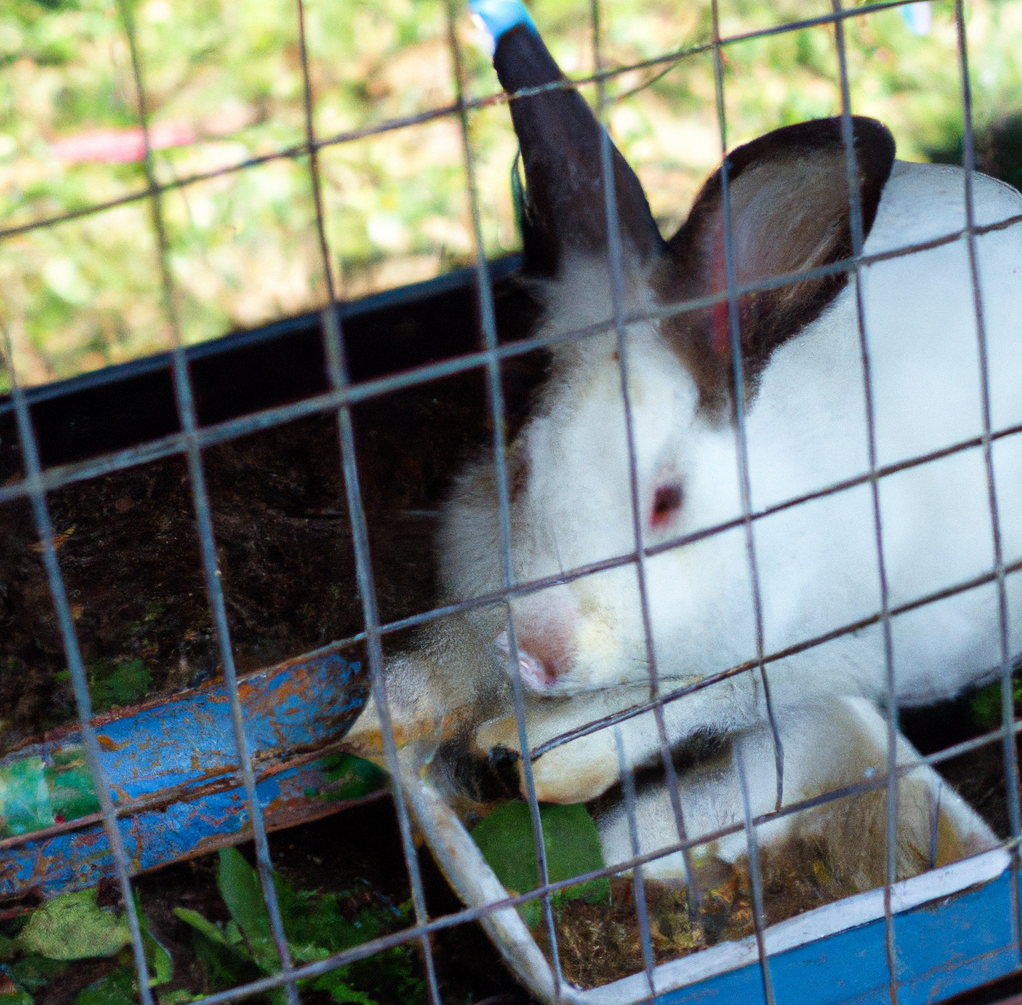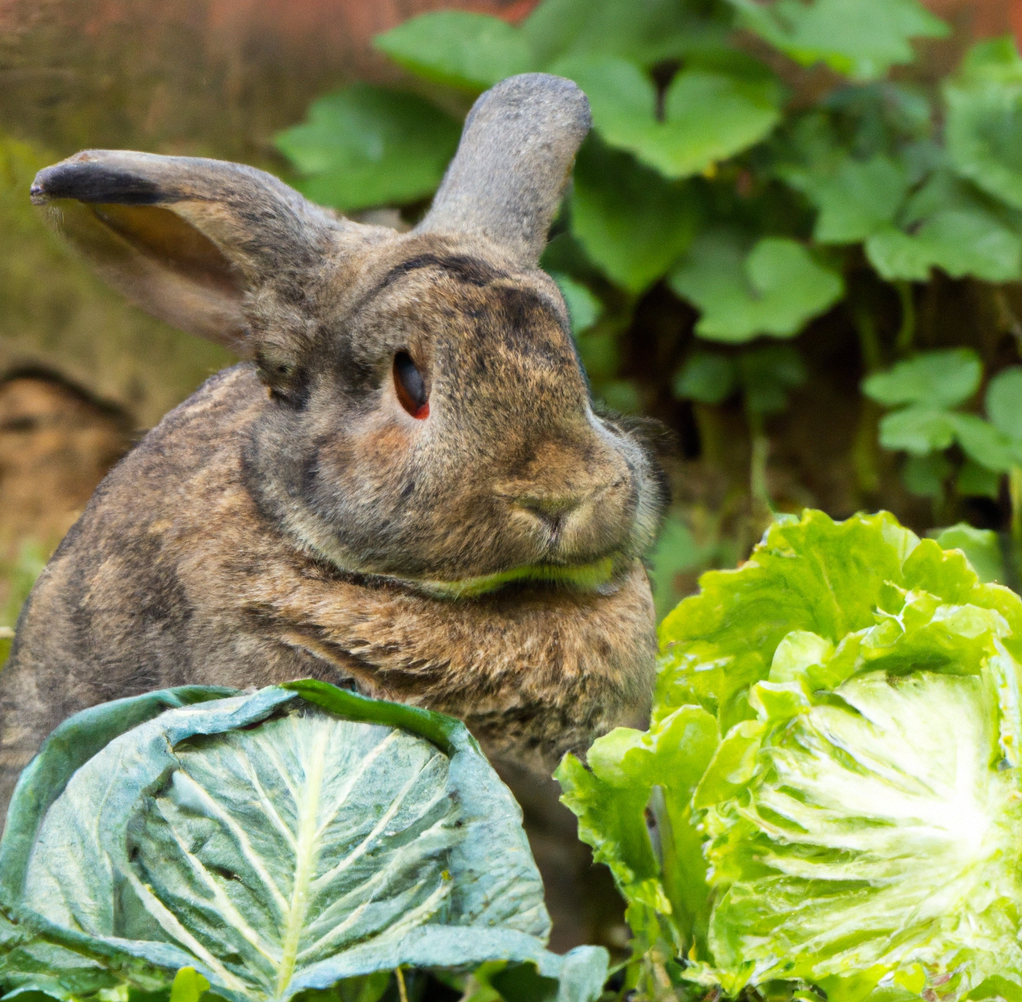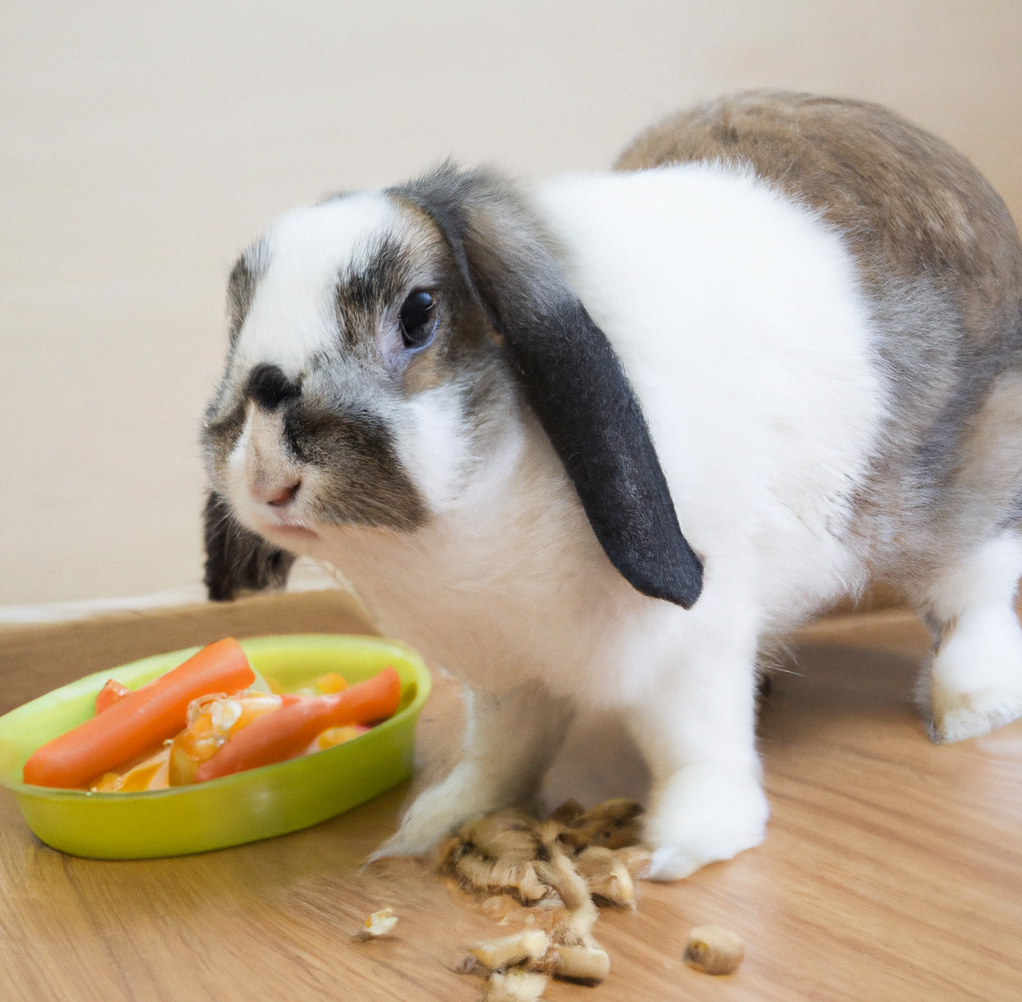Will rabbits stop eating when full? This is a common question among rabbit owners, as it is important to ensure that your pet is being fed in a healthy and balanced way. In this article, we will explore the answer to this question in detail, as well as provide some tips on how to ensure your rabbit is receiving the right amount of food. We will also discuss the importance of a healthy diet for rabbits and how it can help them live a long and happy life.
The Digestive Process in Rabbits: How to Tell When They’ve Had Enough to Eat
Rabbits are herbivores and possess a unique digestive system that helps them to extract the most nutrients from their food. As such, it is important to understand the digestive process in rabbits, so that owners and caretakers can determine when their rabbits have had enough to eat.
The digestive process of rabbits begins with the consumption of food. Chewing and grinding are the first steps of digestion, which are performed by the incisors and molars of the rabbit’s mouth. The food is then swallowed and enters the stomach, where it is mixed with digestive juices. The stomach then pushes the food through to the small intestine, where the majority of digestion and absorption occurs. Nutrients are absorbed further down in the large intestine, where water is also reabsorbed, forming solid waste. Finally, the waste is passed through the rectum and excreted through the anus.
Since rabbits have an efficient digestive system, they are able to consume a large amount of food in a short period of time. To tell when a rabbit has had enough to eat, it is important to look for signs of satiety. Rabbits will typically stop eating when they are full and will give up on food if they are feeling full. Additionally, if a rabbit has been eating for an extended period of time, they may start to groom themselves and become less interested in their food. It is important to observe how much a rabbit eats each day and to ensure that they are eating a balanced diet. If a rabbit is not eating enough, it is important to consult a veterinarian to determine the cause and appropriate course of action.
By understanding the digestive process in rabbits, owners and caretakers can ensure that they are providing their rabbits with the correct amount of food and nutrition. This will help keep them healthy and happy, and prevent any digestive issues from occurring.
The Pros and Cons of Free Feeding Your Rabbit: Should You Let Them Decide When to Stop Eating?
Free feeding, or providing your rabbit with unlimited access to food, is a controversial topic among rabbit owners. While it can be an effective way to keep your furry friend well nourished and satisfied, it’s important to weigh the pros and cons before allowing your rabbit to decide when to stop eating.
The biggest advantage of free feeding is that it eliminates the need to monitor your rabbit’s food intake. Rabbits have a natural instinct to eat when they’re hungry, so free feeding can ensure your pet gets the nutrients it needs without you having to constantly monitor how much it’s eating. This also makes it much easier for owners to feed multiple rabbits since each individual animal can eat according to its own needs.
On the other hand, free feeding can lead to overfeeding, which can cause health problems in rabbits. If rabbits eat too much, they can develop obesity, digestive issues, and even painful bloat. To avoid these problems, it’s important to monitor your rabbit’s food intake and provide healthy snacks in moderation.
Overall, the decision to free feed your rabbit is a personal one. If you prefer to provide your rabbit with unlimited access to food, it’s important to keep an eye on its diet and health. Monitor your rabbit’s weight, activity level, and food intake to make sure it’s not overindulging. If you’re unsure about free feeding, you can also opt for a more controlled feeding schedule where you provide your rabbit with regular meals instead.
Are Rabbits Prone to Overeating? What You Need to Know About Their Feeding Habits

Rabbits are often characterized as being voracious eaters, but this is not necessarily true. While rabbits can eat a lot of food, they are not prone to overeating. It is important to understand the proper feeding habits for rabbits in order to ensure their health and wellbeing.
Rabbits require a balanced diet that is high in fibre and low in sugar and fat. A good diet for a rabbit should include hay, fresh vegetables, and a small amount of commercial rabbit food pellets. Hay should make up the bulk of their diet and should be available to them at all times. Fresh vegetables should be given in small amounts and should vary depending on the season. Commercial rabbit food pellets should also be given in small amounts, and should not exceed 1/8 of a cup per day.
Rabbits should also have access to clean, fresh water at all times. Water should be changed daily to ensure that it is free from bacteria and other pollutants.
It is important to remember that rabbits are grazers, meaning that they prefer to eat small, frequent meals throughout the day. This means that it is best to provide them with food in multiple locations throughout their home. This will encourage them to move around and explore their environment, which can help keep them active and healthy.
It is also important to remember that rabbits can become obese if they are overfed. It is important to monitor the amount of food that they are eating and adjust their diet accordingly if they are gaining too much weight.
In conclusion, rabbits are not necessarily prone to overeating. However, it is important to understand the proper feeding habits for rabbits in order to ensure their health and wellbeing. This includes providing them with a balanced diet that is high in fibre and low in sugar and fat, access to clean, fresh water, and allowing them to graze throughout the day. Additionally, it is important to monitor the amount of food that they are eating to make sure that they are not becoming overweight.
How to Keep Your Rabbit from Becoming Overweight: Practical Tips for Managing Their Diet
Rabbits are wonderful pets to have, however, like any animal, it is important to ensure that their diet is managed properly in order to ensure that they remain healthy and at a healthy weight. Overweight rabbits can suffer from a variety of health issues, so it is important to be proactive in keeping your rabbit fit and healthy. Here are some practical tips for managing your rabbit’s diet:
1. Monitor their weight regularly. Your veterinarian can help you determine your rabbit’s ideal weight and make sure that your rabbit is not gaining or losing too much weight.
2. Feed them a diet of hay, fresh vegetables, and limited amounts of pellets. Hay should make up the majority of your rabbit’s diet, with fresh vegetables and pellets making up the rest.
3. Avoid giving your rabbit treats. If you want to give your rabbit a treat, opt for fresh vegetables or a small handful of pellets.
4. Make sure your rabbit has access to fresh water at all times.
5. Ensure that your rabbit is getting enough exercise. Your rabbit should be encouraged to move around and play in order to stay active.
6. Monitor the amount of food that you are giving your rabbit. Make sure not to overfeed your rabbit, as this can lead to obesity.
By following these tips, you can help ensure that your rabbit remains healthy and at a healthy weight. However, it is important to speak to your veterinarian if you have any concerns about your rabbit’s health or diet.
Unusual Ways to Keep Your Rabbit from Overeating: What You Need to Know
Rabbits are adorable and very intelligent animals that require a lot of care and attention. Many owners are concerned about their rabbit’s diet, as rabbits have a tendency to overeat and can become overweight if they consume too much food. Fortunately, there are some unusual ways to keep your rabbit from overeating.
One of the simplest ways to keep your rabbit from overeating is to provide them with toys and activities to keep them occupied. This can include hiding treats around the cage so they have to work to find them, providing them with chew toys, or even introducing a new type of hay to keep them entertained. This will help to keep your rabbit active, and will reduce their overall food intake.
You can also try feeding your rabbit small amounts of food throughout the day, rather than one large meal. By doing this, you are able to monitor the amount of food they are consuming and ensure they are not overeating. It is also important to make sure that your rabbit has constant access to fresh water, as this will help to keep them hydrated and reduce their cravings for food.
Finally, it is important to pay attention to your rabbit’s body language. If they look bloated or uncomfortable after eating, then it is time to reduce their food intake. Additionally, if your rabbit appears to be eating excessively, then consider introducing a foraging toy or a hay feeder to help them regulate their food intake.
By following these tips, you can help ensure that your rabbit remains healthy and happy. Keeping your rabbit from overeating is an important part of their overall wellbeing, and these unusual methods can help keep their diet balanced and healthy.
Nutritional Needs for Healthy Rabbits: How to Ensure They Get the Right Amount of Food
Having healthy, happy rabbits requires that their owners provide them with the right nutrition. To ensure that your rabbits are getting all the nutrition they need, here are some key tips to keep in mind.
First, it’s important to provide your rabbits with a balanced diet of hay, fresh vegetables, and a small amount of pellets. Hay is a crucial part of a rabbit’s diet, providing essential fiber and nutrients. It should make up the majority of their diet. Fresh vegetables should also be offered daily, as they provide essential vitamins, minerals, and fiber. Pellets provide additional nutrition, but should only be offered in small amounts, as too much can lead to obesity.
Second, it’s important to be mindful of the portion size of food that you’re giving your rabbits. A good rule of thumb is to give about 1/4 cup of pellets per 5 pounds of body weight, and 1-2 cups of fresh vegetables per day. The amount of hay should be unlimited, as rabbits need to have hay available to them at all times for proper digestion.
Finally, it’s important to monitor your rabbits’ food intake and weight. If you notice that your rabbits are eating less than normal or losing weight, it’s important to take them to the vet to get a checkup. It’s also important to provide your rabbits with fresh, clean water at all times.
By providing your rabbits with the right nutrition and monitoring their food intake, you can ensure that they stay healthy and happy.
Common Reasons Why Rabbits Stop Eating: What to Do When They Refuse Food

If your rabbit stops eating, it could be an indication of a serious health issue. Thus, it is important to pay attention to any changes in your rabbit’s eating habits and to seek medical advice from a veterinarian as soon as possible.
Common Reasons Why Rabbits Stop Eating
There can be a variety of reasons why a rabbit may stop eating, ranging from medical issues to behavioral problems. Some of the most common reasons include:
1. Pain or illness: Pain or illness can cause a rabbit to lose its appetite. If the rabbit is in pain, it may be reluctant to eat due to fear of the pain. Also, certain diseases, such as gastrointestinal stasis, can cause a rabbit to stop eating.
2. Stress: If a rabbit is stressed, it may lose its appetite. Stress can be caused by a variety of factors, including a change in environment, a new housemate, or a fight with another rabbit.
3. Diet: A diet lacking in variety can cause a rabbit to become bored with its food and stop eating.
4. Tooth problems: If a rabbit has a tooth issue, such as a broken or overgrown tooth, it may be uncomfortable eating and thus lose its appetite.
What to Do When They Refuse Food
If your rabbit stops eating, it is important to take it to the veterinarian for a checkup as soon as possible. The veterinarian will be able to diagnose any underlying medical issues and suggest the appropriate course of treatment.
If there are no underlying medical issues, you can try to encourage your rabbit to eat by offering it a variety of foods, such as hay, greens, and fruits. You can also try to make the food more appealing by adding treats, such as dried herbs or pieces of carrots.
Finally, make sure your rabbit is in a quiet and comfortable environment, free from stress. If your rabbit is uncomfortable in its environment, it may be reluctant to eat.
In summary, if your rabbit stops eating, it is important to pay attention to any changes in its eating habits and to seek medical advice from a veterinarian as soon as possible. Common reasons why a rabbit may stop eating include pain or illness, stress, diet, and tooth problems. If there are no underlying medical issues, you can try to encourage your rabbit to eat by offering it a variety of foods and making the food more appealing. Finally, make sure your rabbit is in a comfortable and quiet environment.
How to Tell If Your Rabbit is Full: Signs to Look Out For
Rabbits are delightful and entertaining animals that can bring joy to any home. However, they have specific dietary requirements that must be met in order to ensure their health. It is important to be able to tell if your rabbit is full so that you can avoid overfeeding them. Here are some signs to look out for that can help you determine if your rabbit has had enough to eat.
1. A decrease in their appetite. If your rabbit is full, they may not be as interested in their food as they usually are. They may not eat their portion as quickly, or they may skip meals entirely.
2. A decrease in physical activity. If your rabbit has eaten enough, they may become less active than usual. They may take longer naps or spend more time lounging around.
3. An increase in grooming. Rabbits groom themselves as a way of self-soothing. If your rabbit has had enough to eat, they may start spending more time grooming themselves.
4. A decrease in vocalizations. Rabbits can be quite vocal when they are hungry. If your rabbit has had enough to eat, they may become quieter and less vocal.
5. An increase in sleeping. If your rabbit is full, they may take more naps than usual and sleep longer.
By being aware of these signs, you can tell if your rabbit is full and prevent overfeeding. If you notice any of these signs, it is best to wait until they are hungry again before offering them more food. This will help ensure that your rabbit stays healthy and happy.
Conclusion
Based on the available evidence, it appears that rabbits will not always stop eating when they are full. They may continue to eat until the food source is gone or until their stomachs become uncomfortable. This behavior can be dangerous for the rabbit, as overeating can lead to obesity and other health problems. To ensure your rabbit is healthy and not overeating, it is important to monitor their food intake and provide them with a balanced diet.

